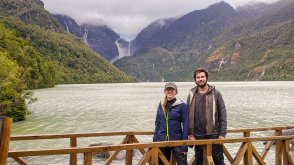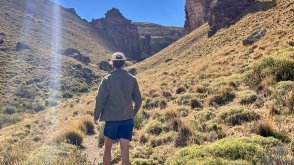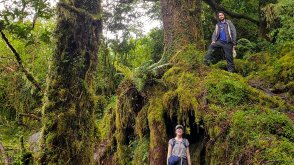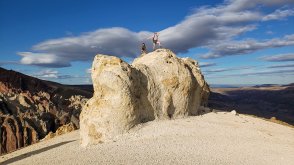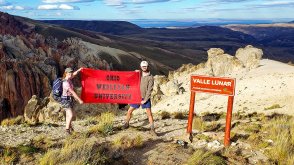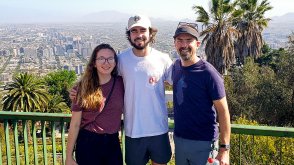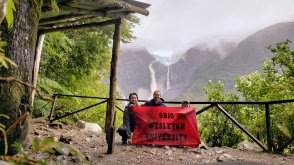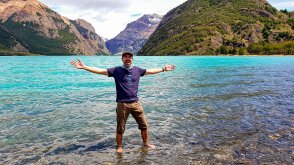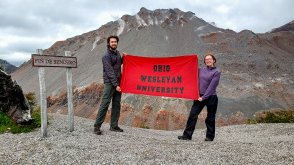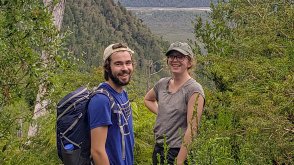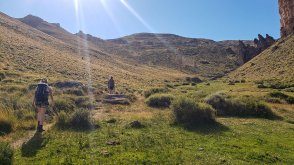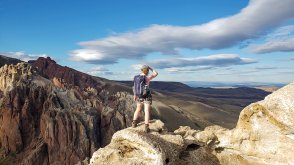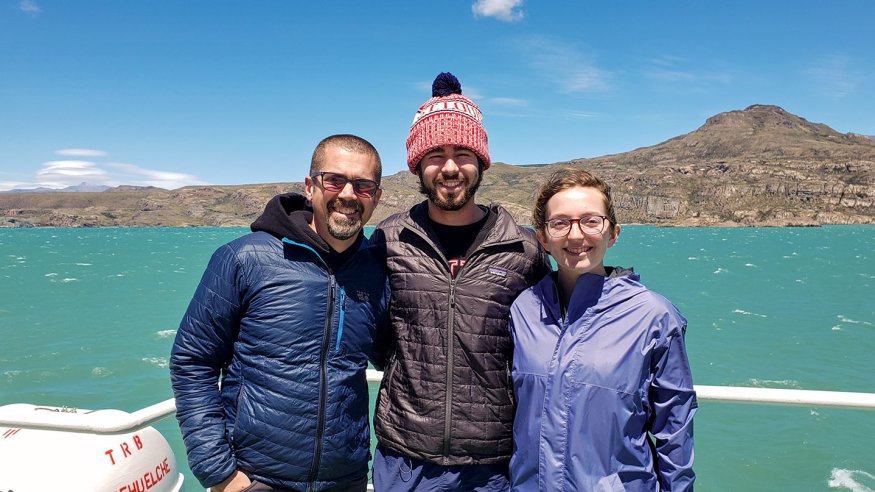
Conservation Collaboration
Ohio Wesleyan Students Research Park Preservation, Public Impact in Chile
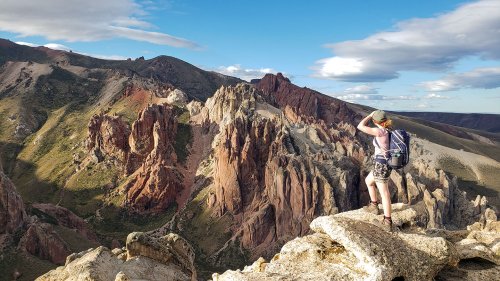
Name: Alena Arnold ’23
Hometown: Ashland, Ohio
Majors: Environmental Science and Biology
Minor: Sociology-Anthropology

Name: Jonathan Munroe ’24
Hometown: Kirkwood, Missouri
Major: Geography
Minor: Music Performance (violin)
OWU Connection Experience: Theory-to-Practice Grant-supported trip to Chile to collectively explore “Chile’s ‘Route of Parks’: A Model for Public-Private Conservation” and conduct individual research.
Alena Arnold ’23 and Jonathan Munroe ’24 traveled to Chile for nearly two weeks in December and January with William Hayes, associate chaplain and director of Wilderness Ministry for Ohio Wesleyan, who wrote the university-funded Theory-to-Practice Grant (TPG).
Of the experience, Hayes said: “Being in Patagonia and seeing it firsthand is something that’s hard to describe – from the scale of the landscapes we encountered to the range of experiences we had with the land and the people. We learned about the story of conservation in this place in ways we would not get from a book or through a screen. I’m so grateful to have had this experience with these students.”
Collaborative Research
Arnold: “Our study of conservation in the area consisted of two main elements: The first was visiting the national parks that make up Chile’s ‘Route of Parks’ along the Carretera Austral. The second was interviewing Chileans who are involved in park management or are impacted by the changes that have been happening with the parks.
“We felt that it was important to visit the parks themselves to see how they were organized, how their trails and maintenance compared to U.S. parks, and how they were geared for tourism, which is a growing industry in this area in Patagonia.
“Our interviews provided a more insightful look into the history of the parks, including how they have changed over recent years and how the formation of the Route of Parks has impacted stakeholders from all sides.”
Munroe: “Throughout our trip, we interviewed the people who work and live in and around the parks and the effects CONAF (Corporación Nacional Forestal) and the Tompkins Foundation have had on their lives. We also had the opportunity to hike in four different national parks to see current conservation projects and grants in practice. With our information, we will be putting together a presentation to present the findings of the TPG.”
Individual Research
Arnold: “My individual project focused more on my interests in biology and environmental science, and was geared toward the understanding of conservation in Chilean Patagonia, especially the conservation of plant and animal biodiversity.
“I asked interview questions to gain a deeper knowledge of the flora and fauna of the parks we visited, including threats to biodiversity. I also focused on conservation efforts, especially in our conversations with the CONAF office, which is very involved with reforesting protected lands and undertaking projects like removing barbed wire fences.
“Finally, I was observant of plant and animal species we encountered on our hikes within the parks. My goal was to learn more about how conservation efforts are being implemented in Chile, and how they fit into the context of the greater scientific and conservation community.”
Munroe: “My separate project was focused on ecotourism and what accessibility looks like in these parks.
“In the United States, many of our national parks have turned into mass-tourist destinations with disregard for the land and animals in the environment. Other destinations of natural beauty can only be accessed by people who have wealth privilege or the resources necessary to visit.
“While examining these parks, I looked at what infrastructure was in place for accessibility and interviewed CONAF rangers on how many people were visiting these parks. Additionally, we asked our interviewees if CONAF was more concerned about catering to tourists or conservation of the parks.”
Lessons Learned
Arnold: “One of my biggest takeaways from this trip was the importance of nonprofit and government collaboration in conservation. This theme has been discussed in many of my classes such as Environmental Politics and Policy and Human Impacts on the Environment.
“In Patagonia, nonprofits like Fundación Reforestemos work with the Chilean government-support CONAF, which manages natural parks, to reforest degraded areas. The Tompkins Foundation, which donated huge amounts of land to Chile to be made into national parks, had a central role in building the Route of Parks into what it is today. It was fascinating to learn from the collaboration between all of these groups as they work toward conserving and protecting Patagonia.
Munroe: “In human geography, we look to see the impact that space and place have on people. The questions I asked consistently throughout our trip were, ‘What is Patagonia,’ and ‘What does Patagonia mean to you?’
“Answers varied from ‘rain, loneliness and isolation’ to ‘this is where my heart and soul lives.’ It was special to see the emotion in people’s eyes when I asked this question because you could really see their connection and love for the land.”
Developing Skills
Arnold: “One skill that I was thrilled to develop on this trip was my Spanish-speaking ability. I hope to study abroad in Peru in the fall semester, and I am very interested in working in South America in the future, so I was eager to practice speaking and understanding Spanish, especially in the context of conservation. I truly feel that my confidence and ability increased exponentially even over the short time frame of this trip. …
“Traveling to Chile opened my eyes to another way of life, one of tiny towns with no gas stations; of setting off boat flares to mark the new year; of stunning mountains on a scale beyond reason; and of a single road connecting them all.”
Munroe: “I learned how to be a better traveler and world citizen. This was my first big trip out of the states and in a country where I didn’t speak the main language. It took some time to adjust but with the help from the adviser, I became comfortable and respectful in my environment. …
“True learning comes from hands-on experience. I wouldn’t have gained the knowledge and true emotions of Patagonia from a website or textbook, it’s only something you learn from connecting with the land.”
Favorite Moments
Arnold: “My favorite moment of the entire TPG was on our hike in Queulat National Park. We crossed a raging glacial river on a swinging bridge, hiked up the side of a massive foothill, through a waterfall, and up to a lookout point overlooking the Hanging Glacier.
“The moment that we crested the final rise and the canyon yawned out in front of us, the glacier and its waterfalls in full view, was my favorite moment. Words cannot describe the scale of this place, nor its fierce beauty. … I am still convinced that that glacier may be the most beautiful thing I will ever see.”
Munroe: “Hiking to see the hanging glacier waterfall in Queulat National Park. I had seen many pictures online of the park, but nothing could’ve prepared me for how massive and beautiful it was.”
Why Ohio Wesleyan?
Arnold: “I am really passionate about traveling and learning about other cultures and ecosystems, and I truly believe that OWU is exceptionally supportive of travel experiences. … Our science department is also just amazing, and professors are always willing to help you with whatever goals you have.”
Munroe: “My sister (Cora) graduated from Ohio Wesleyan in 2014. When it came time to look at schools, Ohio Wesleyan was on the list, and I absolutely loved the Geography department.”
Post-Graduation Plans
Arnold: “I hope to work in conservation in the future, and I would love to travel and work internationally. OWU’s TPG and study abroad program is definitely helping me to achieve those goals by offering me conservation experience in other countries.”
Munroe: “I would like to attend grad school for urban studies/urban planning and eventually work for a nonprofit that does neighborhood revitalization without displacement.”

